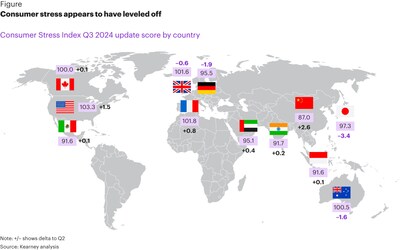Kearney Consumer Institute Releases 4th Consumer Stress Index: Q3 Consumer stress levels are surprisingly stable, but concerns lurk below the surface
In the U.S., optimism about the country's political future rose by 5% in Q3
- U.S. Consumer Stress Index is up (+1.5 points) from Q2 2024
- China saw the largest uptick in stress (+2.6 points) while Japan saw the biggest drop (-3.4 points)
- There's a "noticeable shift" in countries/regions with elections coming up
CHICAGO, Oct. 16, 2024 /PRNewswire/ -- The Kearney Consumer Institute (KCI), an internal think tank of global strategy and management consultancy Kearney, today released the fourth quarterly edition of its Consumer Stress Index, Currents Hiding in Quiet Waters. Based on a finely calibrated set of macroeconomic data and consumer input, the Index provides a multi-faceted view of consumer sentiment, beyond economics. The newest report, Kearney Consumer Stress Index Q3 2024, finds that even though changes from last quarter's Index were slight, consumers tend to have a delayed reaction to stressors such as inflation and election.
"This past quarter, we've seen that while increased certainty around the upcoming election is stabilizing some consumer stress, reaction to some key stressors, such as declining inflation, will be lagging," notes KCI lead Katie Thomas, who leads the ongoing research series. "Looking ahead to 2025 and our first year-over-year comparison of consumer stress data, we're keeping an eye on longitudinal patterns such as personal job security, which could drive a holdback in spend on big ticket items, and consumer conflict over data privacy and social media platforms."
The Consumer Stress Index tracks multiple components: macroeconomic data, which is updated annually; and consumer sentiment, which is calculated using two elements: consumer flexibility or consumer agency in terms of perceived optionality and ability to impact conditions; and consumer sensitivity or awareness—what issues are top of consumers' minds and how they are feeling. Data for the Q3 2024 report was fielded in September.
"As we've often observed, consumer behavior does not always match up to traditional consumer sentiment metrics," said Thomas. "Despite the concerns people are voicing about the economy, the reality of their spending behavior doesn't match up—locally, for example, we're seeing crowded malls and plenty of spending, and we're getting similar reports from other geographies."
The Q3 report finds that U.S. consumers have increasingly expressed concerns over their ability to lower their cost of living, a concern echoed by consumers in France. Despite inflation easing, consumers continue to feel stretched, borne out by several top retailers reducing prices and bundling discounts—a sign that consumer reactions to market changes are not immediate.
"Recurring news can lead to numbness," Thomas noted. "Our research found that despite ongoing global conflict, U.S. geopolitical stress is down over five index points from our initial report for Q4 2023. Consumers in Germany echoed a similar sentiment, and their political score declined eight points on the Index. Sadly, the shock of certain news tends to decline over time, as consumers develop coping mechanisms to deal with ongoing strife."
Read the full report by clicking this link.
For more information, or to schedule an interview with Katie Thomas or receive a copy of the newest Consumer Stress Index study, please contact:
MKPR/Meir Kahtan
+1 917-864-0800
mkahtan@rcn.com
Kearney Consumer Stress Index Methodology
The Kearney Consumer Stress Index was created to examine consumer behavior globally by taking a broader view of consumer sentiment. It combines proprietary research, surveys, and analytics with publicly available data and reports, weighing and balancing macroeconomic factors, consumer flexibility, and consumer sensitivity.
Macroeconomic sources comprise 50 data points from leading global sources such as Oxford Economics, which are then organized into five pillars—consumer wallet and finances, health and education, geopolitics and government, food and the environment, and innovation and technology—across 15 subcategories. This provides a quantitative, factual baseline for initial analysis of consumers.
Both the consumer flexibility and consumer sensitivity sections use proprietary consumer surveys as their primary input, with more than 20,000 global consumers surveyed (2,000 respondents in each of 12 countries). Survey results are used to determine scores across pillars and subcategories. The consumer flexibility component shows consumer optionality and ability to flex to, and/or impact or influence, changing conditions. The remainder of the model—consumer sensitivity—reflects consumer top-of-mindedness and feelings on pillar sub-factors.
Combined, the three elements create the Index, the values of which reflect relative changes within a country based on consumer stress, leading to potential changes in behavior.
About the Kearney Consumer Institute
The Kearney Consumer Institute (KCI) perspective. By leveraging consumer behavior data and insights, the KCI helps generate conversation, and ultimately action, around how to address consumer needs with meaningful benefits.
Using a consumer-first lens the KCI looks at today's consumer revolution not by thinking about consumers, but by thinking like consumers. Our consumer-centric approach includes simple, precise, plain-language conversations on topics like trends, consumer communities, convenience, loyalty, service, fair pricing, and product development and technologies.
About Kearney
Kearney is a leading global management consulting firm. For nearly 100 years, we have been a trusted advisor to C-suites, government bodies, and nonprofit organizations. Our people make us who we are. Driven to be the difference between a big idea and making it happen, we work alongside our clients to regenerate their businesses to create a future that works for everyone. www.kearney.com
U.S. Media contact:
Meir Kahtan, MKPR
mkahtan@rcn.com
+1 917-864-0800
![]() View original content to download multimedia:https://www.prnewswire.com/news-releases/kearney-consumer-institute-releases-4th-consumer-stress-index-q3-consumer-stress-levels-are-surprisingly-stable-but-concerns-lurk-below-the-surface-302278429.html
View original content to download multimedia:https://www.prnewswire.com/news-releases/kearney-consumer-institute-releases-4th-consumer-stress-index-q3-consumer-stress-levels-are-surprisingly-stable-but-concerns-lurk-below-the-surface-302278429.html
SOURCE Kearney

 Index Options
Index Options CME Group
CME Group Nasdaq
Nasdaq Cboe
Cboe TradingView
TradingView Wall Street Journal
Wall Street Journal
